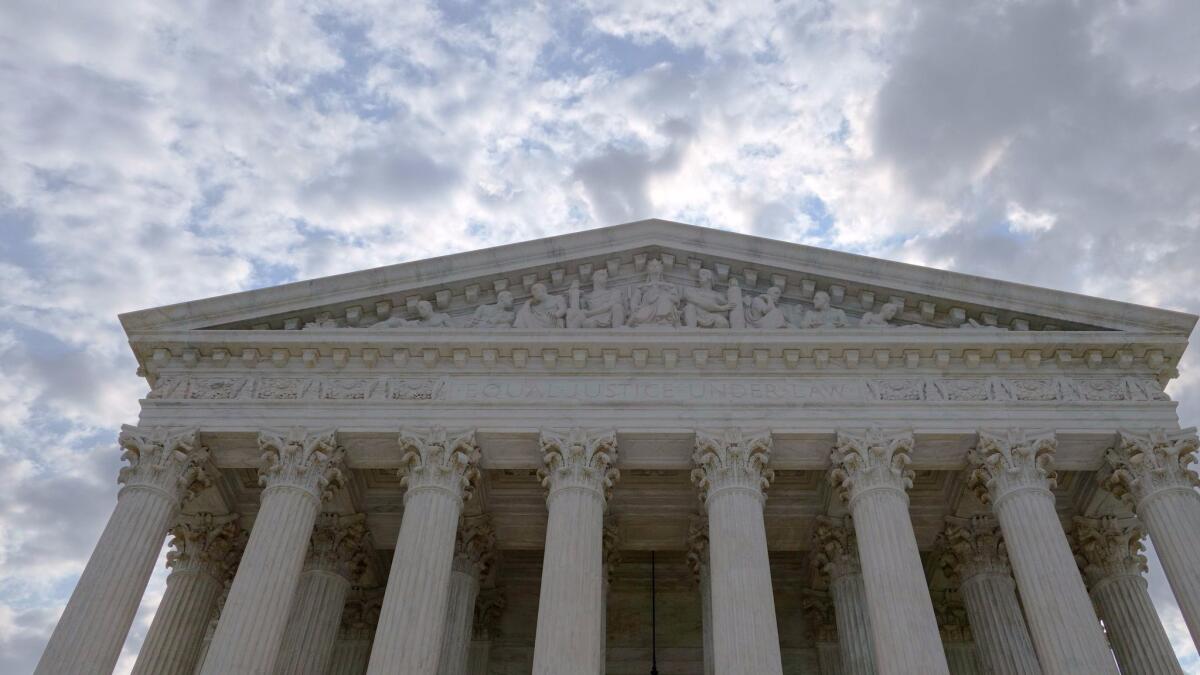Supreme Court will decide whether police can use cellphone data to track suspects

- Share via
Reporting from WASHINGTON — The Supreme Court has agreed to decide whether police need to provide evidence of a crime before they may obtain data from cellphone towers that show where a suspect has traveled.
Although it revolves around the right to privacy, the case does not involve intercepting private conversations over a cellphone or seizing the personal data that are stored in the phone.
Three years ago, in Riley vs. California, the court said police need a search warrant and evidence of “probable cause” before they may download the contents of a phone.
But most courts have said people do not have the same right to privacy for data kept by others, including the logs of calls that are maintained by telephone companies.
Federal law, however, limits how and when the police may obtain records of cellphone calls. They must obtain a court order and show “there are reasonable grounds to believe” the records “are relevant and material to an ongoing criminal investigation.”
Lawyers for the American Civil Liberties Union say the court should set a higher standard and require police to show proof of “probable cause” a crime has been committed before they may obtain records from cellphone towers. They said phone company records are obtained “tens of thousands of times” each year.
In Carpenter vs. United States, the ACLU appealed on behalf of a Michigan man who was convicted of a series of armed robberies in the Detroit area. Prosecutors relied on testimony from his accomplices, but they also obtained and used records of his cellphone use over 127 days. The records confirmed Timothy Carpenter made calls from towers that were within a mile or two from four of the robbery sites.
A federal judge and the U.S. 6th Circuit Court of Appeals, in a 2-1 ruling, rejected Carpenter’s claims that the use of the cellphone data violated his rights under the 4th Amendment. But the justices voted to hear the issue in the fall.
Several of them, including Justices Sonia Sotomayor and Samuel A. Alito Jr., have said they are concerned that computerized data gathering, if unchecked, could allow the government to improperly track individuals.
Separately on Monday, the court handed down the following decisions:
-- In a one-line order, it upheld a lower court’s ruling that the election districts for North Carolina’s General Assembly, like its congressional districts, were drawn along racial lines and are unconstitutional. But it set aside a separate ruling that required the state to redraw this electoral map this year, rather than by 2018 when the next regular elections are scheduled. In an unsigned opinion, the justices questioned the need for immediate special elections.
-- The court put a five-year time limit on when the Securities and Exchange Commission can seek to recover ill-gotten gains from people who are convicted of stock fraud. The law sets a five-year statute of limitations for “any civil fine, penalty or forfeiture” for violating the securities law, but the agency had said an order to “disgorge” ill-gotten gains was not a penalty. By a 9-0 vote, the court disagreed in Kokesh vs. SEC.
--The court limited the government’s authority to obtain money from a “co-conspirator” in a crime who did not receive any of the tainted funds. Terry Honeycutt worked as a store clerk in a Tennessee hardware store owned by his brother, Tony. They were indicted as drug conspirators for selling 20,000 bottles of Polar Pure, a water purification product that can be used to make methamphetamine. Tony pleaded guilty and agreed to forfeit $200,000. Terry was convicted and given a five-year prison term, even though he did “not stand to benefit personally” from the drug scheme. Prosecutors insisted he must forfeit nearly $70,000, and the 6th Circuit agreed that all the co-conspirators are liable. In Honeycutt vs. United States, the justices disagreed unanimously. A forfeiture “is limited to property the defendant himself actually acquired as the result of the crime,” Sotomayor said. “Because Honeycutt never obtained tainted property, [the law] does not require any forfeiture.”
To read the article in Spanish, click here
On Twitter: DavidGSavage
More to Read
Get the L.A. Times Politics newsletter
Deeply reported insights into legislation, politics and policy from Sacramento, Washington and beyond. In your inbox twice per week.
You may occasionally receive promotional content from the Los Angeles Times.











